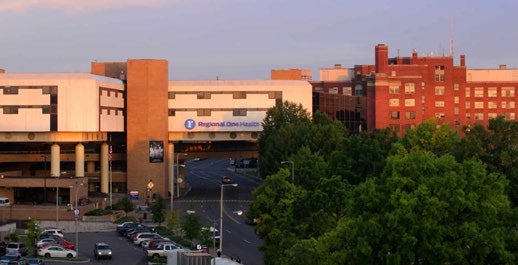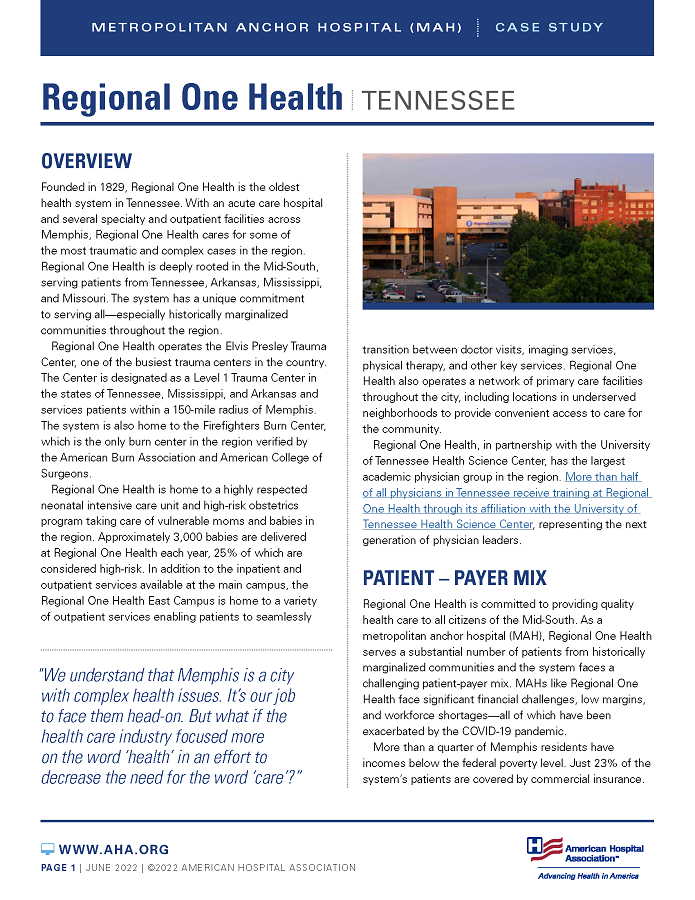

Regional One Health | Tennessee
Metropolitan Anchor Hospital (MAH) | Case Study
Overview
 Founded in 1829, Regional One Health is the oldest health system in Tennessee. With an acute care hospital and several specialty and outpatient facilities across Memphis, Regional One Health cares for some of the most traumatic and complex cases in the region. Regional One Health is deeply rooted in the Mid-South, serving patients from Tennessee, Arkansas, Mississippi, and Missouri. The system has a unique commitment to serving all—especially historically marginalized communities throughout the region.
Founded in 1829, Regional One Health is the oldest health system in Tennessee. With an acute care hospital and several specialty and outpatient facilities across Memphis, Regional One Health cares for some of the most traumatic and complex cases in the region. Regional One Health is deeply rooted in the Mid-South, serving patients from Tennessee, Arkansas, Mississippi, and Missouri. The system has a unique commitment to serving all—especially historically marginalized communities throughout the region.
Regional One Health operates the Elvis Presley Trauma Center, one of the busiest trauma centers in the country. The Center is designated as a Level 1 Trauma Center in the states of Tennessee, Mississippi, and Arkansas and services patients within a 150-mile radius of Memphis. The system is also home to the Firefighters Burn Center, which is the only burn center in the region verified by the American Burn Association and American College of Surgeons.
Regional One Health is home to a highly respected neonatal intensive care unit and high-risk obstetrics program taking care of vulnerable moms and babies in the region. Approximately 3,000 babies are delivered at Regional One Health each year, 25% of which are considered high-risk. In addition to the inpatient and outpatient services available at the main campus, the Regional One Health East Campus is home to a variety of outpatient services enabling patients to seamlessly transition between doctor visits, imaging services, physical therapy, and other key services. Regional One Health also operates a network of primary care facilities throughout the city, including locations in underserved neighborhoods to provide convenient access to care for the community.
"We understand that Memphis is a city with complex health issues. It’s our job to face them head-on. But what if the health care industry focused more on the word ‘health’ in an effort to decrease the need for the word ‘care’?”
Regional One Health, in partnership with the University of Tennessee Health Science Center, has the largest academic physician group in the region. More than half of all physicians in Tennessee receive training at Regional One Health through its affiliation with the University of Tennessee Health Science Center, representing the next generation of physician leaders.
Patient–Payer Mix
Regional One Health is committed to providing quality health care to all citizens of the Mid-South. As a metropolitan anchor hospital (MAH), Regional One Health serves a substantial number of patients from historically marginalized communities and the system faces a challenging patient-payer mix. MAHs like Regional One Health face significant financial challenges, low margins, and workforce shortages—all of which have been exacerbated by the COVID-19 pandemic.
More than a quarter of Memphis residents have incomes below the federal poverty level. Just 23% of the system’s patients are covered by commercial insurance. Approximately 28% are covered by Medicaid or TennCare and 27% are covered by Medicare, yet Medicaid and Medicare make up 66.2% of all visits and 78.3% of total discharges. Medicaid and Medicare make up only 35.1% of net patient revenue. Approximately one in four patients are uninsured and Regional One Health provides an average of $67.3 million in uncompensated care each year.
Regional One Health's Unique Approach to Care
Proactively Address Social Determinants of Health
Some patients tend to utilize high-cost services, like emergency department care, more than others. Many times, these patients come to the hospital for reasons beyond their physical health needs. In Memphis, which has a 22% poverty rate compared to the national average of 12%, social determinants of health impact individuals and the community. Some patients come to the ED because it is the only place they can get medications for chronic conditions or the only place they can find food or shelter.
To address the health care needs of these patients more efficiently and effectively, Regional One Health partnered with the nationally recognized nonprofit Camden Coalition to create the ONE Health Complex Care Program in 2018. Using a data-driven approach, ONE Health identifies “high-utilizers.” Then, the ONE Health team, comprised of nurses and social workers, meets the individuals where they are, builds authentic relationships with them, and helps them identify their greatest needs. ONE Health then helps proactively address these needs by connecting patients with housing and employment resources, helping them apply for Medicare, Medicaid, and Social Security, and letting them know about community-based primary and specialty care services. Since the program’s inception in 2018, ONE Health has served more than 700 patients. This work has reduced emergency department visits by 42%, inpatient hospital admissions by 55%, and length of stay by 61% among program participants.
Engage with the Community to Prevent Violence
In 2021, Memphis leaders launched the Group Violence Intervention Program to address the growing epidemic of gun violence in the Memphis community. The program is designed to support community interventions with police and social services. This work is complemented by Regional One Health’s hospital-based violence intervention program. The hospital has outreach staff and violence intervention liaisons who work with patients who are the victims of violent crimes with the goal of disrupting the retaliatory cycle of violence. The city of Memphis predicts this program will help reduce the murder rate by 10%.
Metropolitan Anchor Hospitals Need Support
Despite the financial challenges it faces, Regional One Health continues to support innovative programs to improve the health and wellbeing of its community—especially when it comes to serving historically marginalized communities. With more stable resources, Regional One Health would be able to purchase state-of-the-art medical technology and expand programs to combat various community health issues. Ultimately, MAHs like Regional One Health need support to advance their successful programs, strengthen patient outcomes, and further improve health in their communities.


